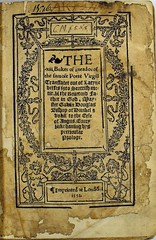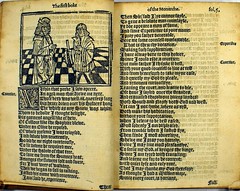Early translations – into Scots and out of Scots

In the early 1500s vernacular translations of the classics were almost unheard of. No major classical work had yet been translated into English. So poet and Bishop of Dunkeld, Gavin Douglas’s (c. 1474-1522) Eneados, a Scots translation of Virgil’s Aeneid, was pioneering. The translation was not just intended for the rich and aristocratic but for all, including ‘masteris of grammar sculys’, teaching on their ‘benkis and stulys’. This 1553 edition has been in Glasgow University Library since at least the 1600s.

Sir David Lindsay (fl. 1490-1555) was a writer, poet and courtier in the court of James V. Like Gavin Douglas, Lindsay saw the value of writing in Scots, the spoken language of the Scottish people. He wanted to ensure his work was available to as many people as possible – not just an educated elite. The Dialogue, his most ambitious work, is a 6338 line poem on world history from the Garden of Eden through to Judgement Day. Since it had a reforming tone, critical of corruption in the Catholic Church, it was very popular in newly-Protestant Scotland. This English translation from the original Scots, carried out in 1566 after Lindsay’s death, demonstrates that his work was also popular in Elizabethan England.



